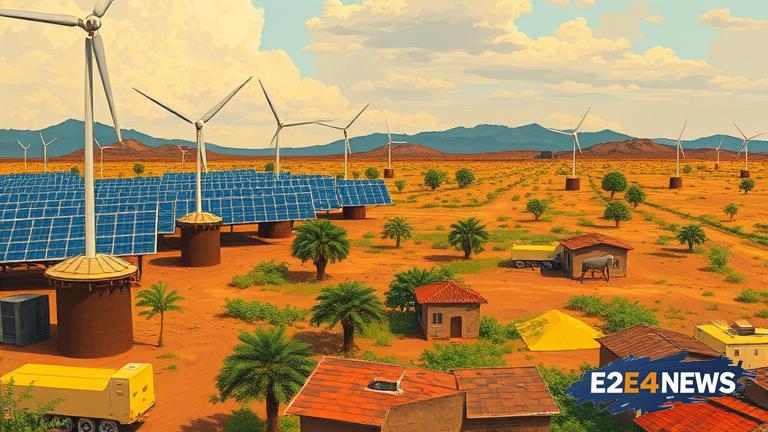The African continent is witnessing a significant shift towards renewable energy, driven by the need to address the pressing issues of energy access, energy security, and climate change. With many countries still struggling to provide reliable and affordable electricity to their citizens, renewable energy has emerged as a viable solution. Solar and wind power are leading the charge, with countries like South Africa, Egypt, and Morocco investing heavily in these sectors. The cost of renewable energy technologies has decreased dramatically over the years, making them more competitive with fossil fuels. This has led to a surge in investment, with many international companies and organizations committing to support Africa’s renewable energy ambitions. The African Union’s Agenda 2063 has set a target of ensuring access to clean and affordable energy for all Africans by 2030. To achieve this, the continent will need to increase its renewable energy capacity significantly. Several countries have already made notable progress, with Kenya, for example, generating over 70% of its electricity from renewable sources. Rwanda has also set an ambitious target of becoming a carbon-neutral economy by 2050. The benefits of renewable energy are numerous, including reduced greenhouse gas emissions, improved air quality, and enhanced energy security. Moreover, renewable energy can create jobs, stimulate local economies, and contribute to sustainable development. However, there are still significant challenges to overcome, including the lack of infrastructure, limited access to financing, and the need for policy and regulatory frameworks that support the development of renewable energy. Despite these challenges, the momentum behind Africa’s renewable energy revolution is building. The African Development Bank has launched several initiatives to support the development of renewable energy, including the Desert to Power program, which aims to develop 10 GW of solar power in the Sahel region. The European Union has also committed to supporting Africa’s renewable energy ambitions, with a focus on promoting sustainable energy development and reducing energy poverty. China has also become a significant player in Africa’s renewable energy sector, with many Chinese companies investing in solar and wind power projects across the continent. As the demand for energy continues to grow, it is likely that renewable energy will play an increasingly important role in meeting this demand. With the right policies, investments, and technologies in place, Africa can unlock its vast renewable energy potential and achieve a sustainable energy future. The continent’s renewable energy revolution has the potential to transform the lives of millions of people, creating new opportunities for economic growth, social development, and environmental protection. As the world transitions towards a low-carbon economy, Africa is well-positioned to become a leader in the renewable energy sector. With its abundant natural resources, growing economies, and increasing demand for energy, the continent has the potential to become a hub for renewable energy development, innovation, and investment. The future of Africa’s renewable energy sector looks bright, with many opportunities for growth, development, and cooperation. As the continent continues to navigate the challenges and opportunities of the energy transition, it is likely that renewable energy will remain at the forefront of the agenda.
